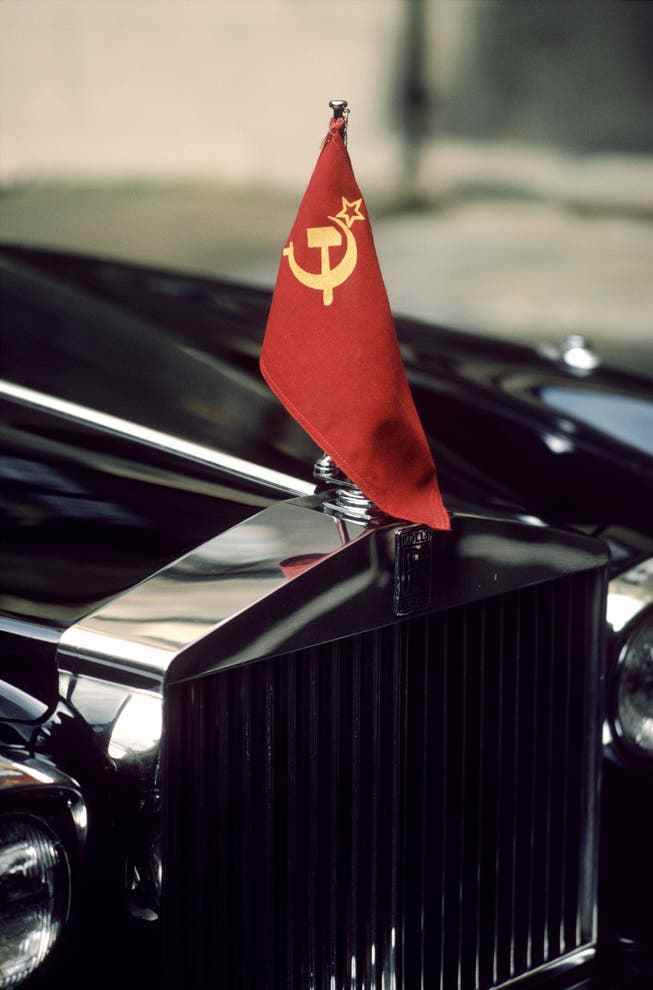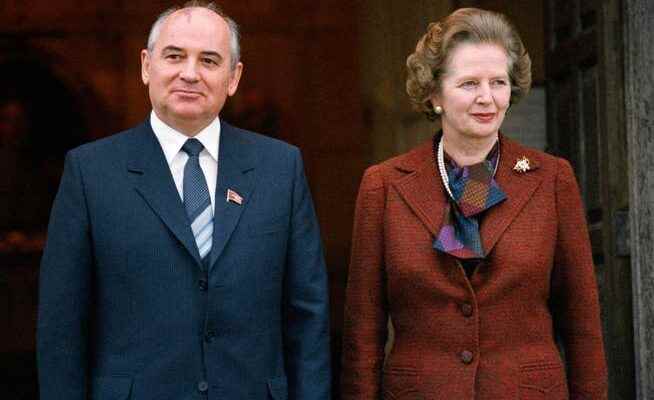Meeting British Prime Minister Thatcher was a key moment in Mikhail Gorbachev’s career. His personality played the decisive role.
Soviet Union Politburo member Mikhail Gorbachev and British Prime Minister Margaret Thatcher on December 16, 1984.
In 1984, no one thought that the sun might ever set on the Soviet Empire. Not that the country (President Reagan’s “evil empire”) was in good shape. On the contrary. This was even more true for the aged management team. Leonid Brezhnev died in 1982 at the age of 76. It was followed by Yuri Andropov, who succumbed to kidney failure after 15 months. He was replaced in 1984 by 73-year-old Konstantin Chernenko, who had only one year to live.
A gigantic arms race was underway between the USA and the USSR, the superpowers of the Cold War, and President Reagan was preparing to arm space with the “Star Wars” program. The Soviets, with their long-sluggish economy, were greatly concerned.
Thatcher meets Moscow’s man of the future
That was when British Prime Minister Margaret Thatcher got involved. She was close to Reagan, but advocated disarmament in order to stabilize the “balance of terror” at a lower, economically viable level. She wanted to talk to the Soviets, not with the ossified old guard, but with those who would own the future.
The Kremlinologists put their bets on Mikhail Gorbachev, the 53-year-old member of the Politburo, whom they believed capable of soon becoming Secretary General. And indeed: in March 1985, three months after visiting Thatcher, the time had come. Chernenko was dead, Gorbachev became the leader of the Soviet Union.
Mikhail Sergeyevich did not know this when he and his wife Raisa drove from London to the Prime Minister’s country residence in Checkers on the morning of December 12, 1984. It was a Sunday, and the Gorbachevs arrived “just in time for lunch,” as Thatcher noted in her memoirs.
A crucial journey for Gorbachev
For Gorbachev, the journey is important. He knows that no Western politician is as close to Reagan ideologically and personally as his hostess. The Soviet Union wants to prevent American space armament at all costs.
Your leadership is aware that the country cannot keep up either technologically or financially. Thatcher can be useful to Gorbachev in two ways: if he persuades her to moderate Reagan’s policy of confrontation, or if he succeeds in loosening the “special relationship” with Reagan.
To the relief of the hostess in Checkers, Gorbachev does not bother with pleasantries and small talk during the aperitif. Instead, he reports on his impressions of driving through rural England.
As the son of a farmer and former secretary for agriculture, he is familiar with agricultural issues, and a lively discussion quickly developed about the different systems in the two countries.

In 1985, a year later, Gorbachev, Secretary General of the USSR, drives up to London in a Rolls-Royce.
The conversation continues over lunch, and Gorbachev now plays all the trump cards of his personality. He is intelligent, confident, open and charming. He is just as reluctant to engage in diplomatic banter as the lady of the house. As soon as the first course is over, the really big issues come up on the table: capitalism versus communism, war and peace. Thatcher is impressed less by what Gorbachev says than by how he says it.
She finds his arguments unconvincing when he insists that the planned economy is not controlled from one center. Especially not when he claims that it achieves higher growth rates than the market economy, which is why people liked living in the Soviet Union. Thatcher snippyly interjects why they are then denied free emigration. It’s a tough debate – for a moment it seems as if Gorbachev is about to stand up in anger.
The “Iron Lady” takes a liking to the Russian guest
But the hostess likes his emotionality, especially since his charm takes away her harshness. The interpreter remembers how Gorbachev winked at him before firing the next rhetorical broadside.
But Margaret Thatcher can also be charming when she wants to. It’s easy with Gorbachev at the table. While the two are engaged in a lively debate, her husband, Denis Raisa, takes Gorbatschova through the library of the house.
“What a contrast to the wooden ventriloquism of the normal apparatchiks,” Thatcher writes in the memoirs. “He laughs, gesticulates, modulates his voice and carries his arguments through clearly to the end. A sharp debater.” Gorbachev does not read from prepared manuscripts. Only now and then does he consult a small notebook.
«As the day progressed I realized that I like him . . .» (I found myself liking him . . .). Instead of leaving at half past four, the Gorbachevs leave Checkers just before six and drive back to the Soviet Embassy in London.
Thatcher laid the basis for Gorbachev’s popularity
Before paying her respects to President Reagan at Camp David the following week, the Prime Minister gave an interview to the BBC. The journalist asks whether she is more optimistic or pessimistic after the meeting with Gorbachev when it comes to political détente and world peace.
She is cautiously optimistic, she replies. She and Gorbachev each firmly believed in the superiority of their different systems. “We will never be able to change each other.” But: «I like Mr. Gorbachev. We can do business together.”
This famous statement by the “Iron Lady” (the term was coined by the Soviet army newspaper in 1976) was used by Gorbachev to an extent that can hardly be overestimated in the years that followed. Thatcher’s verdict set the tone in which the Western media reported on the new man in the Kremlin from then on. In the international relations of the great powers and their allies, it created a leap of faith from which Gorbachev benefited for a long time.
